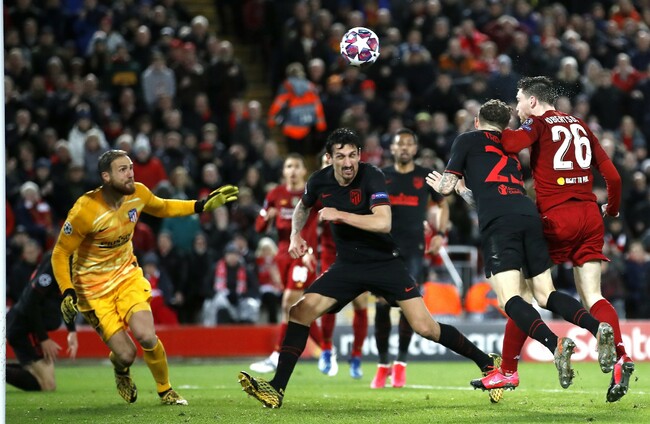THE FOLLOWING PASSAGE is an extract from Now You’re Gonna Believe Us: Our Year, My Story by Andy Robertson.
DRAINED, DEFEATED and disappointed, the last thing I wanted was to be picked for a drugs test. Atlético Madrid had just won at Anfield and our reign as European champions was over.
All I wanted to do was get home to start dealing with our loss. No such luck. Doc Andy Massey tapped me on the shoulder and told me I’d been randomly selected along with Adrian.
Seeing as I’d missed an absolute sitter and Adrian had made a costly error, I didn’t see much point in checking if either of us had taken anything that would enhance our performance.
It is part of the job, though, and rightly so. We followed the Doc out of the dressing room, expecting to be put in another room with the two Atlético players who had also been chosen but a Uefa official told us this wouldn’t be possible. We had to go into separate rooms as a precaution against infection. I lost my head.
Post-match adrenaline wasn’t helping and neither was the result but even without those twin impostors I still would’ve been angry and confused. We had just been in close contact with the Atlético players and probably 60 others involved in the game in various roles. We had tackled one another, we had sweated, we had shaken hands and we had panted our way through one hundred and 20 gruelling minutes.
Yet here we were being told that we could not share a room with two of their players. I’m no scientist but I struggled with the logic of that. The doctor was from Switzerland and there were other medical staff from other parts of Europe. Had they been tested? How could I be sure that they didn’t have something that they could pass on to me? The Swiss doctor probably had similar concerns himself but first he had to deal with mine. “How can you possibly split us up now?” I asked.
“We’ve shaken hands. We’ve been in close contact all game. We’ve had 54,000 people watching us from the stands. And now you’re saying we can’t sit together. Really?” Everyone has their own moment when coronavirus invaded their consciousness. This was mine.
Even with the benefit of hindsight, I still can’t get my head around everything that happened that night. When I was finally able to go home, someone told me about a story in The Times which said social distancing was set to be introduced. The story had obviously come from the government, the same government which had decided that mass gatherings such as football matches were safe to go ahead because the risks of the disease being transmitted were relatively low.
So you had medical professionals saying it wasn’t safe for me to share a room with an opponent on the same night that tens of thousands had been allowed to congregate in close proximity. Forgive me for being confused. Excuse me for being concerned.
Like most people who had been at Anfield, I left the ground wondering what the immediate future held but not for a minute did I think it would be another three months before we were able to play there again. The reality of coronavirus was starting to dawn but its tragic and long-term impact was still to reveal itself. It was the final hour of my 26th birthday and things hadn’t gone to plan but little did I know how much my life and everyone else’s was about to change.
Again, I’m no expert, but looking back, it felt like Britain was looking at the damage that coronavirus was doing in other parts of the world without recognising that it would do the same here. I know we are an island but that doesn’t make us immune to disease, especially in an age when international travel means people are coming and going every minute of every day.
I’m just an ordinary person like everyone else and I like to believe that those in power know what they’re doing whether or not I agree with them politically, but I defy anyone to cast their mind back to the first days of March 2020 and not have concerns about some of the decisions that were made by those in authority.
It’s widely accepted now that the information we were getting at the time wasn’t always ideal and that in certain instances it created a bit of naïvety and possibly a false sense of security too. Again, it is surreal when I think about it. We were all going about our normal everyday lives, in our case training, playing matches and looking forward to the possibility of winning the Premier League, but in the back of everyone’s minds was a growing fear about an invisible killer.
Now You’re Gonna Believe Us: Our Year, My Story by Andy Robertson is published by Reach Sport. More info here.











Thank God for the bench…..never thought I’d say that!
Proud? Proud of scraping by a team that were hockeyed by Scotland last week? Pull the other one Andy
@5sZl1dX2: same team beat the almighty England Ray
Line out complete disaster need a hooker that will throw straight and ryan and Mccarthy need to live up to their big reputation
@frank walsh: paulie ??
@frank walsh: Leinster’s lineout hums along every week with Ryan and McCarthy having very few problems.
Bring O’Connell in to coach it and Beirne to “run” it in the same way he does the worst lineout in Europe for Munster and all of a sudden it’s a disaster.
@teuO6nLS: none of the provinces line outs are statistically very good. Having watched Leinster beat ulster last night neither was impressive except defensively
So much negativity. We won. There were years we never won. Support our team or STFU
@Tony Joyce: we’re top 2 in world and played badly in 3 out last 4 matches.
@Papa Kilo: so what
@Tony Joyce: Glad we won i cant take this negativity anymore i just want to swing at them
@Tony Joyce: how dare you call out Ray and his multiple accounts
The headline “Crowleys impact sees Ireland over the line” does a massive disservice to Craig Casey. He should have been the headline. Forget Crowley v Prendergast. Let’s talk about Casey v Gibson Park.
@Pud: plus the fact that prendergast had a superb game. He oozes class.
It’s a friendly 2 years out from a world cup and we won what are looking for
@Cathal Brennan: we’ve been shocking bar beating a team still hungover after beating Wales something very off at moment.
@Papa Kilo: are we expecting too much from leinster players having to deliver at a high level for club and Country.for some reason they not doing it for Farrell at moment.munster boys did well though.
@Papa Kilo:
@Matt Gilsenan: stupid comment but can’t be helped
@Papa Kilo: Shocking dear god we are a tiny country we win so many games id say we lost 7 games in 3 years won over 20 yes not playing like before the world cup but still winning
It’s been a very underwhelming autumn series. Got out of jail again today. The writing has been on the wall this season, however. Just look at the rubbish being dished out by the provinces. Gets worse every round. Let’s see if munster can improve on the pathetic showing of the other 3 this weekend.
@Ray Ridge: We’re England and we must use every opportunity to make Ireland and its people feel inferior to us
@Ray Ridge: won 3 out off 4 playing badly id take it everyday mr mizerable oh and munster won
@Ray Ridge: Leinster are top of the URC ya pleb hahaha. Ireland outplayed and beat the all conquering Australia without getting out of first gear. What does that say about you and your predictions. Series couldn’t have gone any better. 4 from 5 and plenty to work on and now we know what needs to be improved. Ireland didn’t wake up one morning sh/t£ as you would have people believe with your anti irish rhetoric. Why don’t you go on the English threads and praise the almighty there
The reality is the game is constantly moving and evolving and we have to be willing to go with it. We have played the same way for at least three years and we need to be adaptable which does seem to be a touch lacking. That’s not to say we throw everything out. Some of the innovation off the line out is brilliant but we need to focus on our set piece which are both suspect and then look at how teams have started to counter us. They’re all smart enough guys to recognise this and develop some other wrinkles to the game
Looking at it was a good test. Too many handling errors but it happens. All of the Autumn games we have been giving away cheap penalties. So things can only get better also we looked at a few fresh faces which is always good.
To many none leinster players on the pitch.Beirne,Aki,Hanson,Behlaim should all be dropped and replaced with leinster players.
@Ross Clancy: …learn to spell, !d!0t!
@Ross Clancy: all the money in Dublin and still couldn’t receive an education. It’s true what my grandmother used say, you can’t educate pork
@Ross Clancy: Nice sarcusm
@Ross Clancy: Ross you posted this after 9pm which is way past your bedtime. If it happens again santy will not be bringing you the harry potter Lego set you asked for
Much too much hype about Prendergast – never took the ball to the Aussie defence. Posed no threat. Good kicker from the hand but looked lost when Aussies rumbled forward.